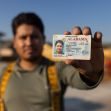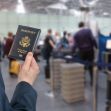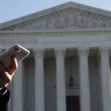A Texas immigration lawyer is suing the U.S. Department of Homeland Security after his phone was seized and searched at an airport upon re-entry into the U.S.
Adam A. Malik was returning home from a trip to Costa Rica when he was stopped at the Dallas-Fort Worth International Airport on January 3. Customs and Border Protection agents stopped Malik, selecting him for what is known as a secondary inspection, then seized his phone during the process.
His selection for secondary inspection by CBP agents comes despite Malik being approved for membership in the CBP’s Global Entry Trusted Traveler Program. Malik was approved for the program in 2014, and his latest renewal in 2019 was also approved. The lawsuit states that CBP agent officer Sullivan informed Malik he was randomly selected for review of eligibility in the Global Entry Program during the secondary inspection. It was later believed that the statement made by officer Sullivan was false.
Malik was interrogated separately by at least three different agents. During the line of questioning, Malik was asked about his law practice, his personal life, his parents, and his immigration into the United States. According to the lawsuit, the agents paid close attention to Malik's law practice and asked him questions about the “legal representation he had provided and continues to provide to certain clients, cases that he had taken on, and the identity of certain past and current clients.” Malik answered questions about his personal life but refused to answer questions pertaining to his clients, citing that such information was “privileged information.” It was during this line of questioning where Malik was asked to produce his iPhone and unlock it.
Malik’s lawsuit, which was filed in the Northern District of Texas on January 25, alleges that Malik’s First and Fourth Amendment rights, including his expressive and associational rights and his right to be protected from unreasonable searches and seizures, were violated. Malik also highlights his professional duties to keep the sensitive information provided to him by his clients secure.
The CBP agents justified the search under a CBP directive that allows a basic search of an electronic device without the need for a search warrant so long as there is reasonable suspicion. The directive also allows for a more advanced search in which the device can be connected to equipment that will allow data to be extracted from the device. According to the directive, if there is no probable cause to keep the phone, the phone will be returned to its owner, and any data that is collected by the government gets deleted.
According to his lawsuit, Malik explains that the directive “fails to define ‘reasonable suspicion’ or ‘national security concern.’” The lawsuit goes on to say, “These terms are vague and capricious.”
A day after Malik was stopped at the airport, he received notification from a calling, texting, and voice mail system Flypsi, Inc. The notification alerted Malik that there was a request made for a verification code in order for his FLYP account to be unlocked. During this time, the phone was still in the possession of DHS and CBP. According to Malik, the agency went ahead with searching and reviewing the information on Malik's phone without informing him, thus violating the directive. Malik argues that sensitive information was not removed by a filter team prior to the phone being searched.
Among other allegations, Malik states that the agency violated the directive by holding on to the phone for longer than a brief or reasonable period of time (the phone was held for 22 days, and is currently still held) and that his phone was searched without reasonable suspicion that he violated any laws.
Malik explains in the suit, “If clients and their lawyers believe that adversaries and the government may one day sift through their communications in searches involving unrelated matters, clients are less likely to be candid with their lawyers, and lawyers will hesitate before writing down what they need to write down.”






